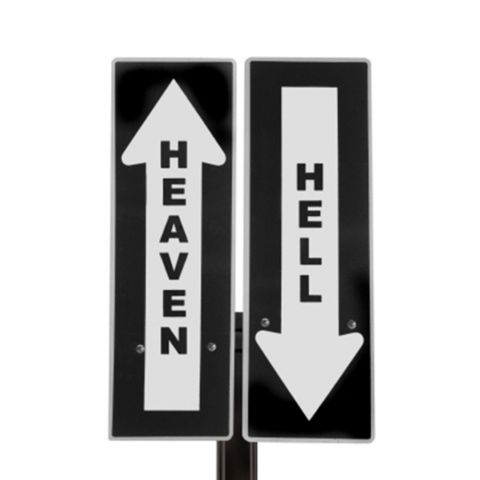Back to series

March 2013
Universalism, the false teaching which negates the consequences of sin and evil and marries heaven and hell into one eternal paradise for all, was just as prevalent in C. S. Lewis’s day as it is today. Lewis’s antidote to this heresy was the “imaginative supposal,” The Great Divorce, in which his readers are taken on a fantasy bus ride showing them the eternal divide or divorce between Heaven and Hell. He writes:

Blake wrote the Marriage of Heaven and Hell. If I have written of their Divorce, this is not because I think myself a fit antagonist for so great a genius, nor even because I feel at all sure that I know what he meant. But in some sense or other the attempt to make that marriage is perennial. The attempt is based on the belief that reality never presents us with an absolutely unavoidable “either-or”; that, granted skill and patience and (above all) time enough, some way of embracing both alternatives can always be found; that mere development or adjustment or refinement will somehow turn evil into good without our being called on for a final and total rejection of anything we should like to retain. This belief I take to be a disastrous error. You cannot take all luggage with you on all journeys; on one journey even your right hand and your right eye may be among the things you have to leave behind. We are not living in a world where all roads are radii of a circle and where all, if followed long enough, will therefore draw gradually nearer and finally meet at the centre: rather in a world where every road, after a few miles, forks into two, and each of those into two again, and at each fork you must make a decision… Good, as it ripens, becomes continually more different not only from evil but from other good.
I do not think that all who choose wrong roads perish; but their rescue consists in being put back on the right road… Evil can be undone, but it cannot “develop” into good… It is still “either-or.” If we insist on keeping Hell (or even earth) we shall not see Heaven: if we accept Heaven we shall not be able to retain even the smallest and most intimate souvenirs of Hell… But what, you ask, of earth? Earth, I think, will not be found by anyone to be in the end a very distinct place. I think earth, if chosen instead of Heaven, will turn out to have been, all along, only a region in Hell: and earth, if put second to Heaven, to have been from the beginning a part of Heaven itself.1
Today, it may not be politically correct to tell others of the “either-or” choice of Heaven or Hell. However, Jesus taught this truth with the goal that his followers might rescue others from Hell’s road, pointing them to the Way that leads to Heaven.
Enter by the narrow gate. For the gate is wide and the way is easy that leads to destruction,
and those who enter by it are many. For the gate is narrow and the way is hard that
leads to life, and those who find it are few.
MATTHEW 7:13-14, (ESV)
1 C.S. Lewis. The Great Divorce. New York: Touchstone, 1996, pp. 9-11.
© 2013 C.S. Lewis Institute. “Reflections” is published monthly by the C.S. Lewis Institute.
8001 Braddock Road, Suite 301 • Springfield, VA 22151-2110 • 703.914.5602 • 800.813.9209 • fax 703.894.1072 • www.cslewisinstitute.org
-
Recent Podcasts
Ralph Waldo Emerson’s Philosophy and Influence
by David George Moore on July 26, 2024Ralph Waldo Emerson was a gifted nineteenth century...Read More
-
The Side B Stories – Nate Sala’s Story
by Jana Harmon, Nate Sala on July 19, 2024
-
Terrorism Through the Eyes of Faith
by Dennis Hollinger on July 12, 2024
-
Recent Publications
Hasn’t Science Proven That Belief in God Is an Outdated Superstition?
by Sharon Dirckx on July 1, 2024Many assume that scientific practice and belief in...Read More
-
Has the Bible Been Corrupted as Some Muslims Claim?
by Andy Bannister on June 1, 2024
-
Seeing Jesus Through the Eyes of Women
by Rebecca McLaughlin on May 15, 2024
0
All Booked
0.00
All Booked
0.00
All Booked
22194
C.S. Lewis’s The Abolition of Man Live Online Small Group 8:00 PM ET
https://www.cslewisinstitute.org/?event=c-s-lewiss-the-abolition-of-man-study-course&event_date=2024-10-02®=1
https://www.paypal.com/cgi-bin/webscr
2024-10-02

Next coming event
Days
Hours
Minutes
Seconds
C.S. Lewis’s The Abolition of Man Live Online Small Group 8:00 PM ET
On October 2, 2024 at 8:00 pmSpeakers

C.S. Lewis Institute
Author





